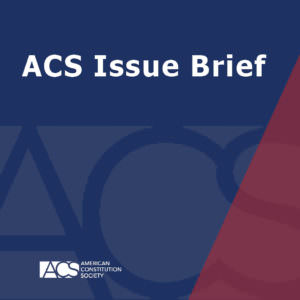A Legislative Approach to Indigent Defense Reform
Professor of Law, The Catholic University of America, Columbus School of Law

ACS is pleased to distribute “A Legislative Approach to Indigent Defense Reform,” an Issue Brief by Cara H. Drinan, Assistant Professor of Law at The Catholic University of America, Columbus School of Law. Nearly every person who has observed the criminal justice system in action has seen that there are serious problems with providing representation to poor people accused of crimes. In 1963, the U.S. Supreme Court held in Gideon v. Wainwright that each state has an obligation under the Sixth Amendment to the U.S. Constitution to provide a criminal defendant with an attorney when he or she cannot afford one. Since then, even the best indigent defense systems have been overburdened, underfunded, and faced a host of other problems that undermine the ability of attorneys to zealously and ethically represent their clients. Attorney General Eric Holder, Congress, and many other federal policymakers have taken notice of this crisis in indigent defense and specifically identified reform of the system as a priority. But what can the U.S. Department of Justice, Congress, and other parts of the federal government do to help bring about reform? Professor Drinan’s Issue Brief is the first in a series that ACS will be publishing focused on ideas about a possible federal role in improving indigent defense systems in states around the country. In her Issue Brief, Professor Drinan proposes a piece of legislation that would allow federal courts to hear claims alleging that a state has systemically violated the Sixth Amendment right to counsel. Some lawsuits like this have made progress recently in state courts in New York and Michigan, but suits of this type are still relatively rare and may not be feasible in every state.
Professor Drinan argues that “[i]ndigent defense reform advocates need an opportunity to bring systemic indigent defense challenges . . . in the federal courts – courts that have traditionally been a refuge for victims of state constitutional violations.” She discusses current obstacles to federal court challenges, and why legislation like what she proposes is necessary and appropriate to make such suits possible. Professor Drinan proposes specific statutory language and discusses how it achieves several important goals, such as clearly affirming each state’s obligation under Gideon, taking full account of relevant Supreme Court precedent, clearly delineating limits on the proper parties to such a lawsuit, and enabling appropriate remedies. She also addresses several likely concerns that critics may raise about a proposal like hers, and concludes that “[g]iven the national crisis in indigent defense services, bold, timely action like the legislation that I propose in this Issue Brief is required and more than justified. Congress should consider enacting this or similar legislation soon, and the Attorney General should push for its passage.”
Read the full Issue Brief here: A Legislative Approach to Indigent Defense Reform
